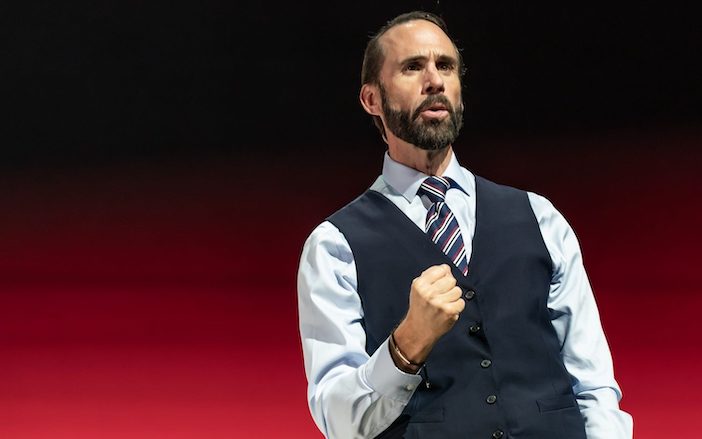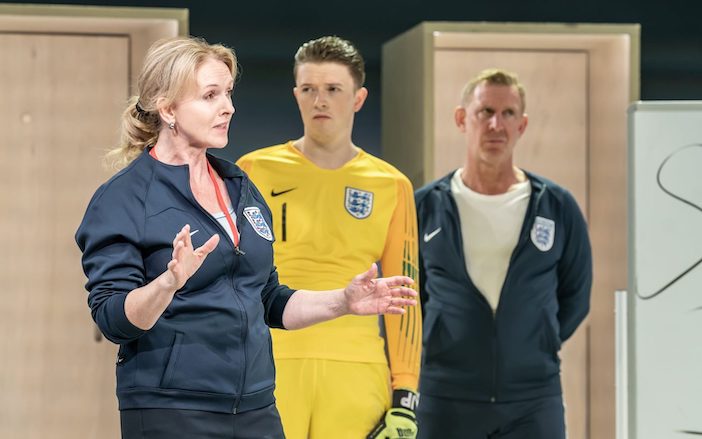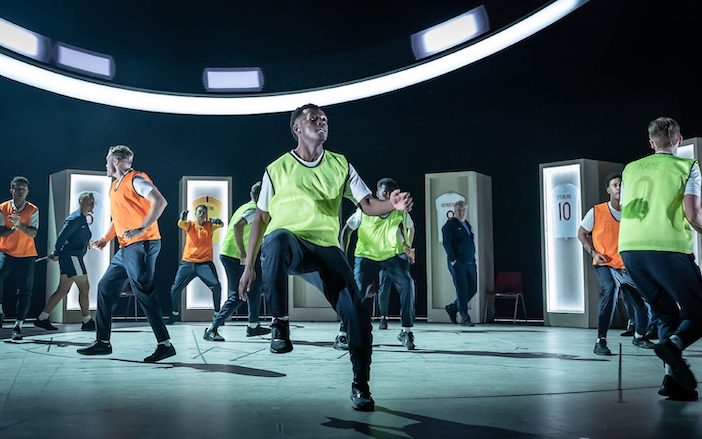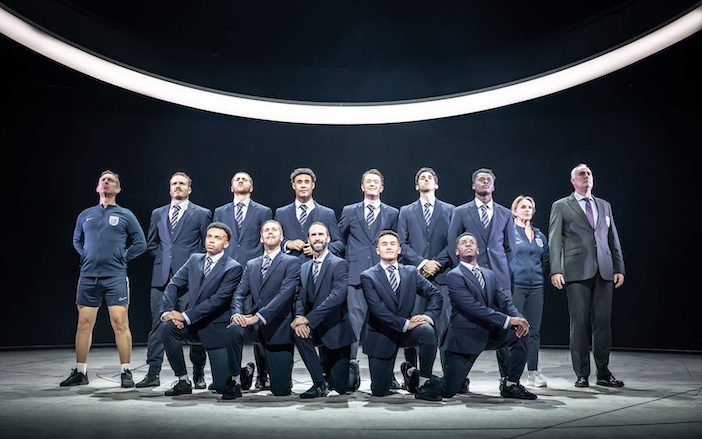This riveting take on the rebirth of the England men’s football team under Gareth Southgate delivers a wide-ranging reflection on sport and country, Alice Payne reviews…
“England needs a new story,” muses Gareth Southgate as he contemplates how to revitalise the England men’s football team as their new manager.
Dear England, whose title references the letter Southgate wrote to the nation encouraging compassion and solidarity ahead of the 2018 World Cup, explores the unfolding of that story with pitch-perfect energy and introspection.
Across nearly three hours, it follows the team and their pensive leader as they navigate the 2018 World Cup, the 2020 Euros and the 2022 World Cup. The outcome may already be known, but writer James Graham braids together the myriad events of this time into a powerfully reflective piece. Dear England is a play about football, but it’s also a play about a nation wrestling with its identity internationally and at home. The revolving door of football managers and prime ministers, the crowdless matches of covid and the death of a monarch all feature – as does racism, child food poverty, inequality and human rights abuses, all played out through the arena of the not-always-so-beautiful game.

Southgate starts his tenure mulling how something is missing. The players have just suffered a humiliating defeat to Iceland, a “dry, volcanic rock”, and things are at a low. To the derision of his colleagues, he announces his desire to “get people happy again” so his team can enjoy playing rather than stumbling under the weight of a nation’s dream – and the vitriol that looms with defeat. His quest takes them on a journey where mental and physical health are brought on par, the concept of masculinity is examined and the players are taught how to be vulnerable, how to face their fears and how to celebrate life’s losses as well as its wins.
It might sound weighty, but under the direction of Rupert Goold this entertaining performance races along with wit and humour, rich emotion, copious swearing, energetic choreography and a kaleidoscope of nostalgia-inducing cultural references – from the Verve’s Bittersweet Symphony to Sven-Göran Eriksson’s suits.

To tackle the enigma, Southgate enlists the help of psychologist and culture coach Pippa Grange. Dervla Kirwan deftly performs Grange’s role as the lone woman in the management team, balancing resilience and compassion as she teaches the players the antithesis of everything they’ve learnt, meaning how to lose. Then there’s Joseph Fiennes’s uncanny transformation into Southgate – simulating his voice, intonation and mannerisms so masterfully it’s easy to think Southgate himself is strolling the stage, complete with beard, side-parting and waistcoat. Fiennes’s experience radiates as he holds the audience captive.
Goold has amassed a strong cast, with Josh Barrow and Will Fletcher being particular standouts as the Sunderland-born Jordan Pickford and Jordan Henderson, respectively. Will Close’s skilful performance as an endearingly inarticulate Harry Kane garners plenty of laughs as the striker’s perfectly captured mannerisms tickle the audience – while his evolution into a respected leader is portrayed touchingly. One of the most poignant moments, however, is Bukayo Saka’s address on racism, delivered directly to the audience by Denzel Baidoo in a speech that transcends the stage.

Sparse, circular and tilted – it’s a stage of which much is asked as it switches between locker room and pitch. Es Devlin’s minimalist design uses large, moveable wooden lockers to intensify the mood, alternating between intimacy and claustrophobia when frustration thickens the air. For the pitch, the lockers are slid away and we’re transported to the sidelines via symbolic lighting and dizzying choreography.
As players face the audience to take their shots, their movements become balletic when pivotal moments are distilled into slow motion, capturing those instants in sport where the world seems to stop for a second. It’s as tense as watching the real thing, with the pain and glory etched visibly on the players’ faces.

Dear England is a fun, pacy, compassionate play that, although fictionalised, humanises a team of young men usually seen through the media lens. Graham and Goold’s re-pairing (after Tammy Faye) cooks up a spirited performance and engaging retrospective on England’s football history, replete with emotional highs and lows, musical hits and lasting questions about the state of the nation.
It’s not necessary to be a fan of football to enjoy this play, nor to be a fan of theatre to enjoy this performance, which transferred to the Prince Edward Theatre after selling out at the National Theatre. As with Southgate’s letter, which implored that the game and country could be enjoyed by all, the Dear England of Goold’s play is for everyone. And it’s a striking hit.
Dear England runs at the Prince Edward Theatre until 13 January 2024. For more information and tickets, visit www.princeedwardtheatre.co.uk. A live recording of the National Theatre’s original production will also be screened in cinemas from 25 January 2024. For more information, visit www.ntlive.com.
Photos by Mark Brenner




